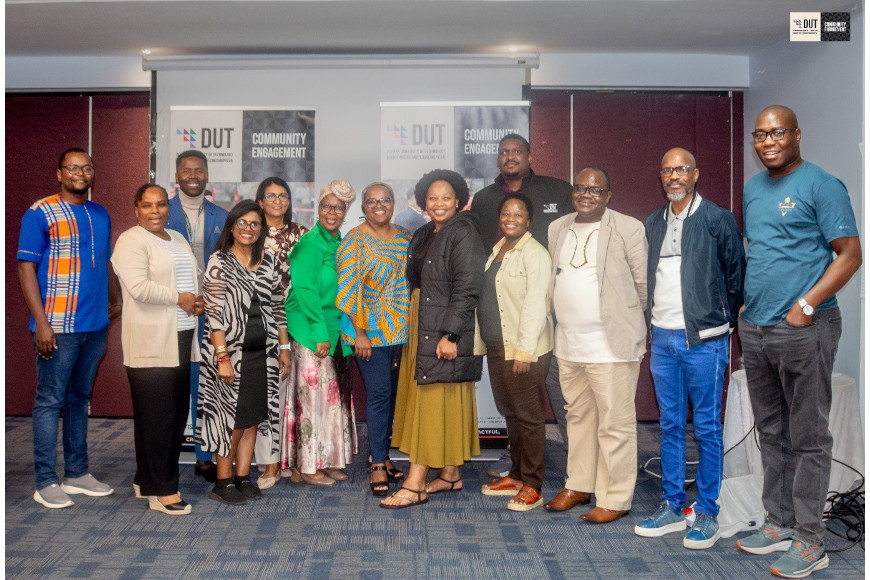The Durban University of Technology (DUT) Community Engagement recently hosted an informative workshop titled “Streamlining Ethics for Community-Engaged Scholarship” at the DUT Hotel School. The workshop provided a platform to explore the evolving role of community engagement in higher education and to examine how universities can integrate teaching, learning, and research with real-world societal challenges, while ensuring that academic work remains socially responsive, ethical, and impactful.
Speaking about the significance of the workshop, Ms Phumzile Xulu, Engagement Practitioner at DUT, said: “As institutions of higher learning, we have both a responsibility and an opportunity to use our knowledge and technical expertise to address real issues facing our communities. Community engagement is not just about outreach activities, it is about building impactful partnerships that produce solutions, strengthen scholarship, and ensure that our work remains responsive to local, regional, and national needs.”
Grounded in the principles of the 1997 White Paper on Higher Education and the 2001 National Plan for Higher Education, the workshop emphasised the importance of fostering ethical and sustainable engagement between students, academics, and communities. Participants explored how project-based and problem-based learning approaches can enhance scholarship, ensure relevance to local and national needs, and contribute meaningful solutions to societal challenges.
The workshop was opened by Dr Nkululeko Zungu, the Engagement Coordinator for the Faculty of Management Sciences, who welcomed participants and encouraged active involvement in discussions, group activities, and collaborative exercises throughout the day.
Professor Pavitra Pillay, Deputy Dean in the Faculty of Health Sciences, in her presentation on Understanding Community Engagement and Engaged Scholarship, highlighted the evolution of engagement in higher education and stressed the integration of community-based practices into scholarship. She said, “Engagement cannot be separated from teaching, learning, or research, it underpins everything we do as universities. True engaged scholarship goes beyond community service, it requires reciprocal partnerships, measurable impact, and scholarly outputs that can be shared and reproduced. In doing so, we not only serve our communities but also strengthen the university’s role in driving societal change.”
In her session titled “Research Ethics: Principles and the Processes (Developing Robust Scholarship in Community-Based Practice),” Dr Dumile Gumede, Faculty Research Coordinator in the Faculty of Health Sciences, unpacked the experiences, tensions, and solutions encountered in community engagement practice. She highlighted the key ethical principles of justice, autonomy, non-maleficence, and beneficence, stressing the importance of recognising community contributions, respecting decision-making rights, anticipating and mitigating risks, and ensuring initiatives bring tangible benefits. Her session encouraged participants to move beyond theory through actionable reflections that strengthen both scholarship and community well-being.
Prof Innocent Nojiyeza, Head of Research and Innovation at the Business School, Faculty of Management Sciences, facilitated an interactive session on “Practice to Scholarship: General Principles and Processes.” Through insightful case studies, participants openly discussed and shared strategies for translating real-world community engagement into impactful scholarly outputs.
In a session titled “Streamlining Ethics Processes for Engaged Scholarship,” Prof Pfano Mashau, Director of the Business School and Chair of the Institutional Research Ethics Committee (IREC), guided participants through strategies to improve and simplify ethical review procedures for community-engaged research. The session emphasized the importance of clear and efficient ethics processes to support impactful scholarship while ensuring that community engagement initiatives adhere to high ethical standards.
Reflecting on the workshop’s profound outcomes, Dr Zungu underscored the intertwined importance of collaboration, ethics, and scholarship in community engagement. “Participants are leaving this workshop with a clear understanding that engagement is far more than simply running projects or taking photographs,” he affirmed. “It is about working collaboratively, ethically utilising data, and producing meaningful scholarship that adds significant value to both the university and the community. Engaged scholarship is a truly reciprocal process: communities gain solutions to real challenges, while the university strengthens its brand, generates impactful research outputs, and fulfils its vision of becoming a truly engaged institution.”
The workshop successfully combined presentations, open discussions, and group activities to ensure participants gained practical, actionable insights into ethical, impactful, and scholarly community engagement.
Pictured: Attendees of the Streamlining Ethics for Community-Engaged Scholarship Workshop
Phumeza Msongelwa

